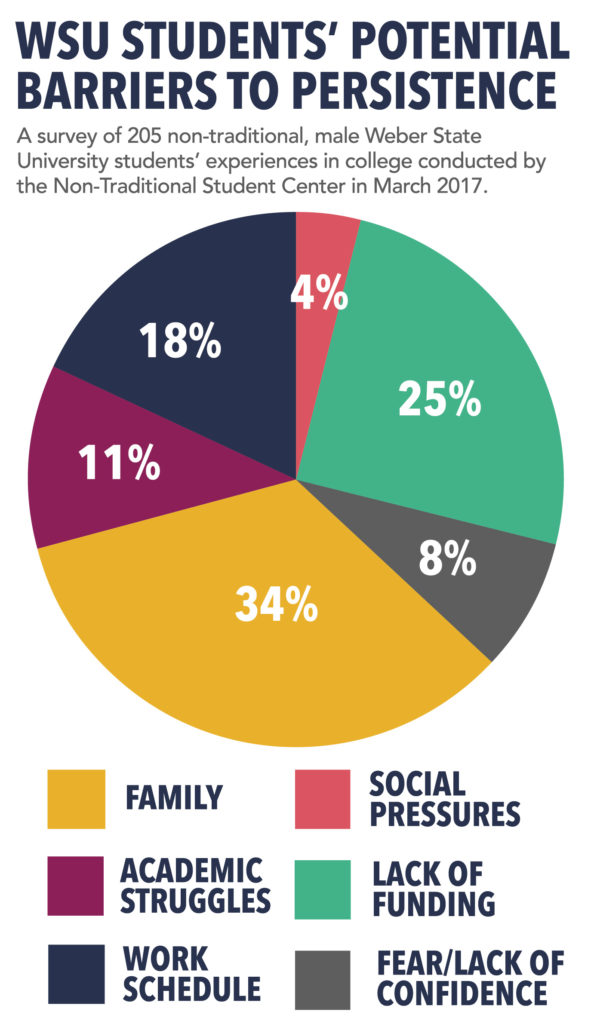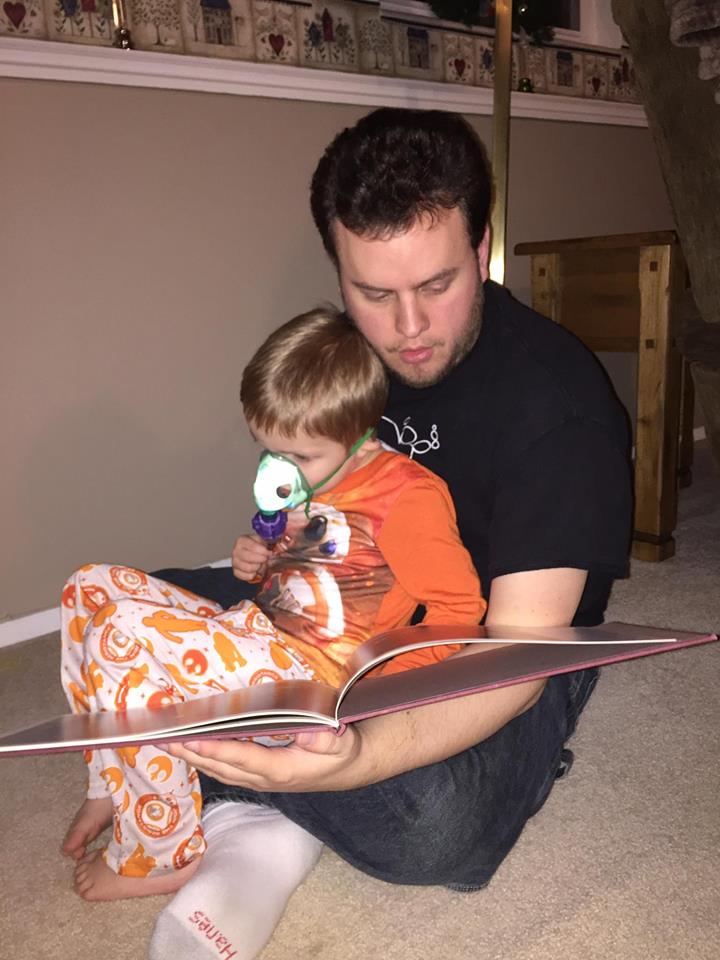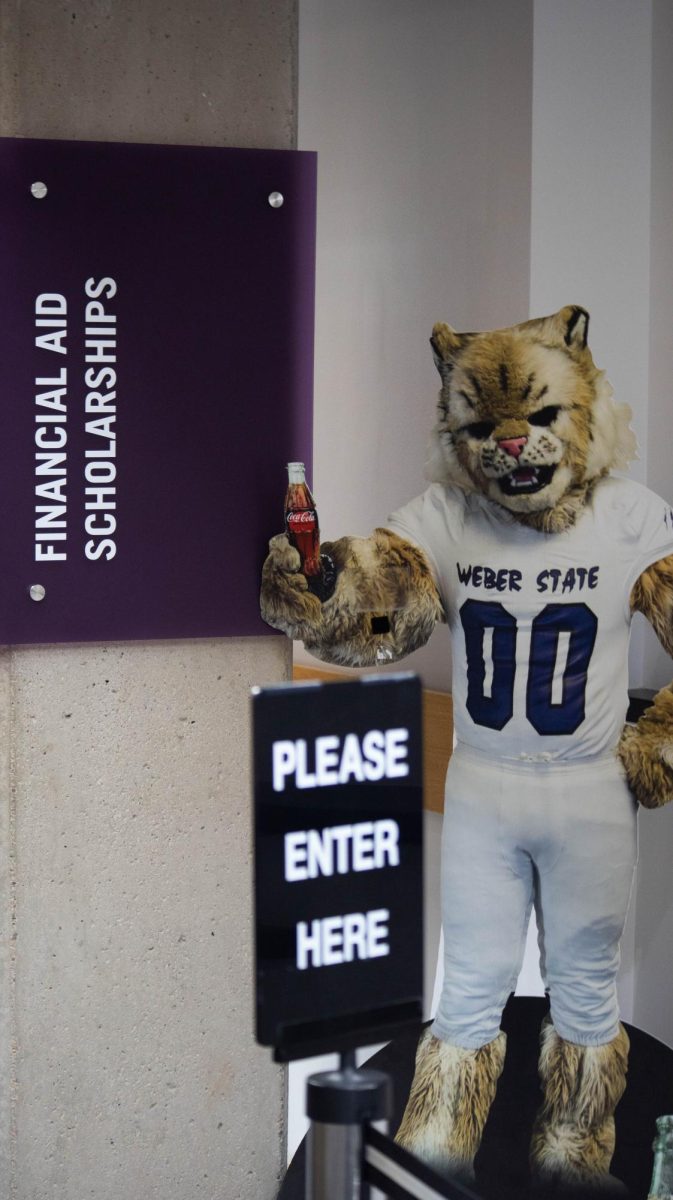Resources at Weber State for non-traditional students are limited. Requirements for scholarships coincide with obstacles and can impede a student’s ability to attend school.
Fathers are among the 51 percent of non-traditional students who attend Weber State and are unequivocally affected by limited resources.
Resources from the Non-Traditional Student Center both provide support and help students remove barriers. The primary resources include setting up math tutoring sessions, aiding in childcare needs, providing financial assistance and connecting to stress reduction aids.

Debbie Cragun, director of the Non-Traditional Student Center, said to fill the gap for students, “We help students get into leadership roles and get into committees that help students receive tuition waivers … as well as help students search for private scholarships and financial resources that may be available.”
Whether the student is a veteran, multi-cultural or non-traditional, the student center gives students a way to connect with opportunities available on an individual basis.
Regardless of the resources available, most students are either unaware of opportunities or do not meet the criteria to receive those resources.
Part-time students, many of whom are fathers and male non-traditional students who make up over half of the student body, either lack the requirements to receive resources or the ability to apply. Scholarships mainly go to full-time students with little left over to give to part-time students. This is on a first come, first serve basis.
Many parents, especially single male parents, must attend school part-time to maintain a job and care for their families outside of school. They would not qualify for scholarships unless they were full-time.

There are currently two scholarships offered through the Non-Traditional Student Center: the Rising Star scholarship and the Swanson scholarship. Cragun explained that part-time students can apply, but many of the funds are given to full-time students and those who attend classes with nine credit hours or more with a GPA of at least a 3.0 or higher.
Noel Wilkinson, a student adviser at the Non-Traditional Student Center, examined 2008 data from the National Center for Education Statistics that observed non-traditional students from freshman year to graduation. Student retention rates declined nationally ― including Weber State ― specifically pertaining to non-traditional male students and fathers who dropped out because of limited resources, financial assistance and home support.
“Weber State’s graduation rate for male and non-traditional students is considerably lower than the national average and takes them anywhere from eight to ten years to graduate,” Wilkinson said.
According to Wilkinson, an estimated 51 percent of students who attend Weber State are part-time, and the majority of them are non-traditional. These students must overcome financial deficits and are part of an underrepresented population.
Most of them have similar reasons and circumstances as to why they leave school: put it off or not finish.

–Chris Morgan | WSU Student | Father of sam (6) Photo credit: Chris Morgan
Wilkinson has been a student adviser at the Non-Traditional Student Center at Weber for four years and officially started a new program for male students this year. The Male Initiatives program unofficially began in the summer of 2013, but started taking ground in the summer of 2016.
The main reason for initiating this program came about when Wilkinson noticed the persistence rates of male students and that the majority left school and never finished.
“I wanted to know if this was an isolated event and was there an anecdote and why, so I started researching statistics on a larger scale, nationally, and noticed that a large percentage of students who didn’t finish school were part-time male students,” Wilkinson said.
Daniel Schaffer was appointed the Male Initiatives Program chair for the year 2017-2018. Schaffer’s two main goals for this year are to focus on giving support to non-traditional male students both at school and home. This will attempt to help them learn how to balance the stress of school and family life in a healthy and developmental way.
Schaffer also wants to start a memory program to help these students learn how to use tools to develop techniques in memory training.
“This is because most of the students only have short periods of time to study, so this will help them make use of their time more effectively since their time is limited,” Schaffer said.
The majority of non-traditional male students provided two main reasons why they do not have the financial means to attend college. Family-home support is scarce, and they either do not finish their degree or find a faster route via trade school, which requires less of their personal time.
Chris Day-Bowers was a non-traditional male student at Weber State, but he decided to forgo his degree based on financial assistance, eligibility requirements and time. He is currently pursuing a certificate at the Ogden ATC in engineering.
Bowers said his decision was based mainly on the hours and the internal environment. There was also less red-tape and “politics” when it came to financial aid, scholarships and availability.
“It’s hard enough to work full-time to take care of your family but to add the stresses of school on top of that, it’s near impossible without the time and the support to do it,” said Tony Peterson, a single father of two children.
The Weber State Non-Traditional Student Center has started new initiatives such as the Male Initiatives program and a new Peer Initiatives program, as well as a separate orientation for non-traditional students. According to Cragun, the Non-Traditional Student Center is also seeking funding for new programs regarding emergency housing, more flexible daycare and more scholarship availability for these students.
Along with all the new resources, a coaching program has been initiated for both student affairs and academic advisers to gain awareness on how to assist non-traditional students.
“It just takes time to find the funding and get the funding to go through after programs like these get started,” Cragun said.
The Weber State non-traditional student portal has separate group pages listed to help students find resources specific to their needs. Whether they are male, female, single parents, married parents or part of a minority group, the resources on this portal are readily available for them to take advantage.
The Male Initiatives program is posted on a separate link to give students a source of information and aid in answering any questions. This will also allow students to research benefits and receive guideline aids on resources needed to start school, stay in school and graduate at a pace both healthy and positive.
In the past decade, non-traditional students have become part of the social norm of the college internal environment and make up over half of the student body. Resources are slowly evolving to meet the needs of these students.
“Eliminating burdens that overshadow students, like funding and availability, is a big step in reducing stress and creating support for these students so that they can graduate and become successful… and that’s why we are here, to help them through whatever barriers they face,” Cragun said.



















